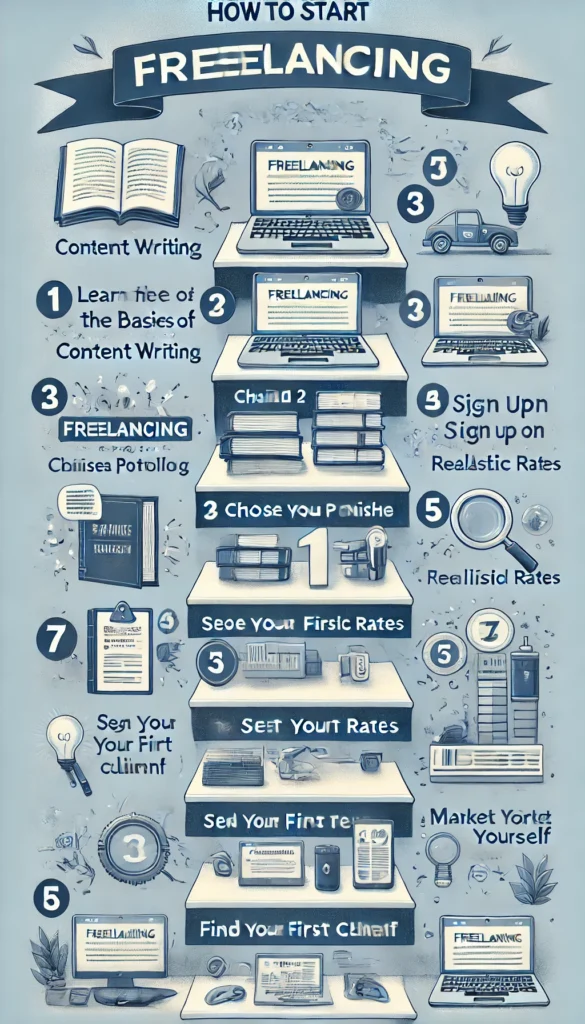Are you looking to work from the comfort of your home while pursuing your passion for writing? Freelancing in content writing might be the perfect opportunity for you! It allows you to write on various topics, choose your clients, and decide your schedule—all while getting paid. With a laptop and an internet connection, you can launch a career that offers flexibility and creative freedom.
In this guide, we’ll explore everything you need to know about starting a career in freelance content writing, from the skills required to finding your first client and thriving in this competitive industry.

What is Freelancing in Content Writing?
Freelancing in content writing means working as a self-employed writer rather than being tied to a company. You take on projects from different clients, write content for their websites, blogs, or marketing materials, and get paid per project or word count.
This form of writing covers many areas, including:
- Blog writing
- Website content
- Social media posts
- Product descriptions
- E-books
- Technical manuals
- Copywriting for ads
Unlike traditional jobs, freelancing gives you the flexibility to choose the topics you want to write about and the freedom to manage your time.
Why is Freelancing in Content Writing Popular?
Content is the backbone of the internet, and every business or individual needs it to communicate with their audience. Whether it’s an engaging blog post, an informative guide, or persuasive sales copy, companies constantly need fresh, high-quality content.
With businesses transitioning online, the demand for skilled freelance writers has skyrocketed. This popularity is due to:
- Work-Life Balance: Freelancers can work from anywhere, at any time.
- Unlimited Earning Potential: Your income grows as you improve and take on more clients.
- Creativity: Writing lets you explore various topics and express your ideas.
Skills You Need to Start Freelancing in Content Writing
You don’t need a degree in English to become a freelance content writer, but certain skills will help you excel:
- Strong Writing Skills:
- Clear, concise writing with correct grammar.
- The ability to adapt your tone and style to different audiences.
- Research Skills:
- Writers often need to create content about unfamiliar topics. Good research ensures accuracy and credibility.
- SEO Knowledge:
- Search Engine Optimization (SEO) helps content rank higher in search engines. Knowing basic SEO techniques is a big plus.
- Creativity and Originality:
- Avoid copying content. Develop a unique writing style that stands out.
- Time Management:
- Freelancing involves juggling multiple projects. Meeting deadlines is crucial.
- Communication Skills:
- Be clear and professional when interacting with clients.
How to Start Freelancing in Content Writing
1. Learn the Basics of Content Writing

Before jumping in, make sure you understand what content writing entails. Read blogs, watch YouTube tutorials, or take free online courses. Platforms like Coursera, HubSpot Academy, and Udemy offer excellent beginner-friendly content writing lessons.
2. Build a Portfolio
A portfolio is like your writing resume. It showcases your skills to potential clients. If you’re new, create sample pieces on different topics to demonstrate your range. Publish your work on free platforms like:
- Medium
- WordPress
3. Choose Your Niche
Selecting a niche helps you specialize and attract specific clients. For example:
- Technology writers focus on gadgets and software.
- Health writers discuss fitness and nutrition.
- Travel writers cover destinations and itineraries.
If you’re unsure, start as a generalist and narrow down your niche later.
4. Sign Up on Freelancing Platforms
Freelancing websites connect writers with clients. Popular platforms include:
- Upwork: Ideal for long-term projects.
- Fiverr: Great for offering specific writing services.
- Freelancer.com: Features a variety of writing jobs.
Create a professional profile highlighting your skills, experience, and portfolio.
5. Set Realistic Rates
As a beginner, start with competitive pricing to attract clients. Research rates on freelancing platforms and gradually increase your fees as you gain experience.
6. Find Your First Client
- Pitch your services on LinkedIn or Facebook groups.
- Apply for jobs on freelancing platforms.
- Network with small businesses or startups.
7. Market Yourself
Use social media and a personal website to showcase your expertise. Share writing tips, blogs, and testimonials from clients to build credibility.
Common Challenges and How to Overcome Them
Starting a freelancing career can be tough. Here’s how to tackle common issues:
- Finding Clients:
- Solution: Use multiple platforms to search for opportunities.
- Solution: Network through forums and writing communities.
- Low Pay Initially:
- Solution: Focus on building your portfolio rather than income at the start. Rates will increase as your reputation grows.
- Writer’s Block:
- Solution: Take breaks, read extensively, or brainstorm ideas before starting.
Time Management Tips for Freelancers
Balancing multiple projects can be overwhelming. Here are some tips:
- Use Productivity Tools:
- Google Calendar for scheduling.
- Trello for tracking progress.
- Prioritize Tasks:
- Break work into smaller, manageable chunks.
- Set deadlines for each task.
- Avoid Distractions:
- Work in a quiet space and turn off notifications.
How to Write High-Quality Content
Here are some practical tips for creating engaging and effective content:
- Understand Your Audience:
- Tailor your writing to their needs, preferences, and pain points.
- Write Catchy Headlines:
- A strong headline grabs attention and encourages clicks.
- Keep it Simple:
- Use short sentences and avoid jargon. Write in a conversational tone.
- Proofread Thoroughly:
- Errors can ruin credibility. Use tools like Grammarly or Hemingway App.
- Add Value:
- Ensure your content educates, entertains, or solves problems for the reader.
Scaling Your Freelance Career
Once you gain experience, you can grow your freelancing career by:
- Creating a Team: Outsource work to other writers and manage multiple projects.
- Offering Additional Services: Expand into editing, proofreading, or content strategy.
- Building Passive Income: Write eBooks, start a blog, or create online courses.
FAQs
How do I start freelancing with no experience?
Start by building a portfolio of sample work. Write guest blogs or publish articles on free platforms to showcase your skills.
What is the best platform for beginner freelance writers?
Upwork and Fiverr are beginner-friendly platforms with plenty of writing opportunities.
How do I set my rates as a freelance writer?
Research market rates and consider your experience. Beginners can start with $0.05–$0.10 per word.
Can freelancing be a full-time career?
Yes, many freelancers turn writing into a full-time career by finding regular clients and scaling their services.
What if I don’t have a niche yet?
It’s okay to start as a generalist. Experiment with different topics and niches until you find one that fits your skills and interests.
Conclusion
Freelancing in content writing is a rewarding and flexible career path for those who love to write. While the journey may require patience and dedication, the opportunities are endless. By improving your skills, building a strong portfolio, and marketing yourself effectively, you can achieve success and financial independence. Start small, stay consistent, and watch your freelancing career flourish!